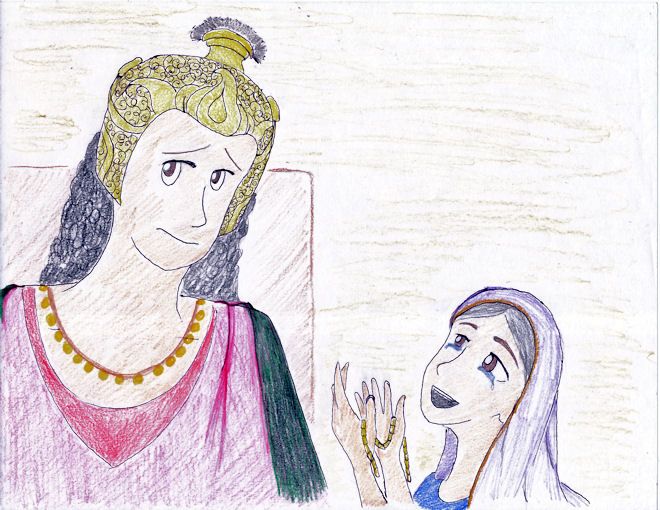
He built three beautiful palaces.
Drawing by Jaclyn Allavie, Eleanor Roosevelt College (UCSD), Class of 2009, by permission

So the king resolved to keep Xīdá-duō happy in the palace. In fact, he built three beautiful palaces. The first was a pavilion made of fragrant wood to serve as the prince's winter palace. The second was made of cool polished marble to serve as a summer palace. The third of was made with good bricks supporting a magnificent green tile roof for rainy days.
King Jìngfàn also had them surrounded by a wonderful garden full of flowers with a lily pond. The garden was so big that the prince could ride his favorite horse and never leave its walls. The horse was named Jiānzhì 犍陟, which meant "ascending ox" because it was so strong, but Xīdá-duō liked to call it Mǎwáng 马王, "King of Horses."
Time passed and the boy prince grew to be a young man. Despite his father's efforts, he was always pensive and morose. So the king summoned his sages and asked what to do to avoid having Xīdá-duō give up the throne and seek enlightenment, as the old sage had once predicted.

"Find him a beautiful wife," they said, "and that will keep him happy and he will not think so much. And it will produce an heir." For they knew that all young men loved beautiful women more than anything in the world.
So the king summoned the most beautiful maidens of his realm to assemble on an appointed day, and he ordered that each was to receive a gift from the prince's own hand. Then he assigned a courtier to watch the prince's face to see which of the lasses he most fancied.
When the day came, the maidens all lined up and filed by Prince Xīdá-duō to receive their gifts, but Xīdá-duō responded to none of them, and the maidens muttered among themselves and puzzled that he was not like other men.

When the last of them arrived, she smiled and said, "What are you giving me?" But the supply of gifts had run out, and the prince had no more gifts to give. Nervously, he smiled back and gave her a gold chain he was wearing.
The official assigned to watch him was delighted, and reported back to the king that this was the chosen girl. Her name was Yéshū-tuóluó 耶输陀罗. She was in fact the daughter of King Shànjué 善觉 of Tiānbì 天臂, his mother's native town. King Jìngfàn immediately sent to King Shànjué to arrange the wedding. Accounts differ as to whether Xīdá-duō was actually any more enthusiastic about the Princess Yéshū-tuóluó than about any of the others, but the die had now been cast, and there was no backing out.